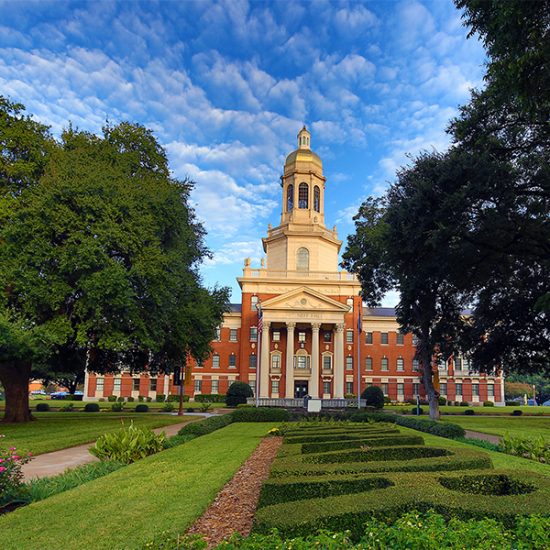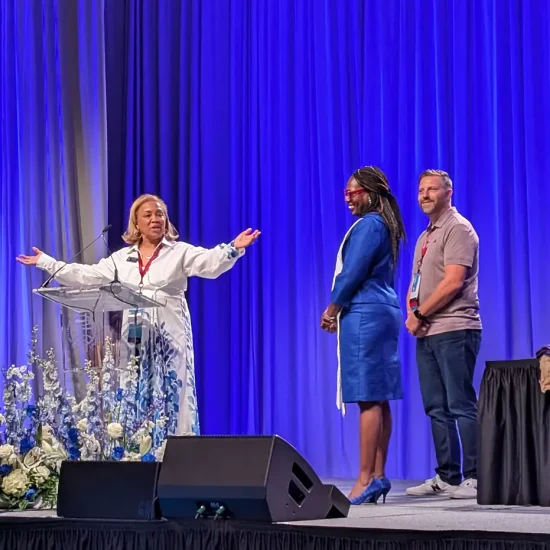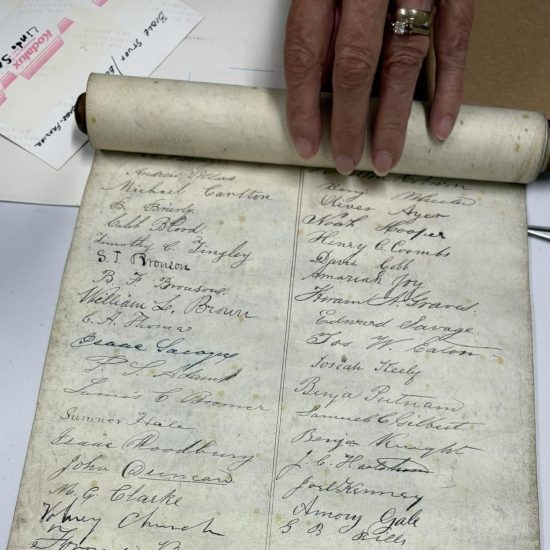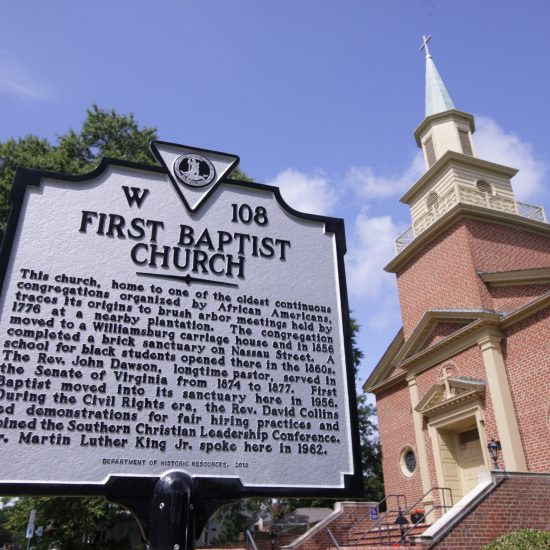ATLANTA (ABP) – Baptists laid aside differences of race, geography and tradition to affirm common values of care for the poor and marginalized in Atlanta and satellite locations across the United States Nov. 17.
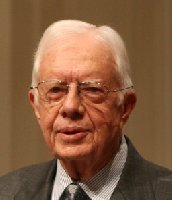
Jimmy Carter gives formal welcome at New Baptist Covenant II.
|
“Our strength and effectiveness will derive from working harmoniously with fellow believers to achieve these common goals,” said former President Jimmy Carter, convener of meetings billed as New Baptist Covenant II.
Carter, who in 2008 convened an original New Baptist Covenant gathering uniting North American Baptists across racial, geographical and theological lines for the first time in 160 years, said traveling around the world he has discovered that non-believers “really have a major impression of Christians.”
“That is of division among us as we argue about authority or priesthood of the believer, interpretation of Scripture, how much emphasis to put on one Bible verse instead of another,” he said.
Carter said hot-button issues like the role of women, homosexuality, abortion, the death penalty, separation of church and state, peace versus reliance on military action, predestination and speaking in tongues are important, but they become an “abomination” when they are allowed to divide the body of Christ.
“What we seek and what we can have is unity,” Carter said. “In fact I’ll go one step further — unanimity.” He asked how many believed salvation comes by grace through faith in Jesus Christ, and every hand at anchor site Second-Ponce de Leon Baptist Church in Atlanta arose.
“At this assembly let us Baptists pray that we and all other Christians will be bound together in Christ in a spirit of peace, love, forgiveness and common purposes,” he said.
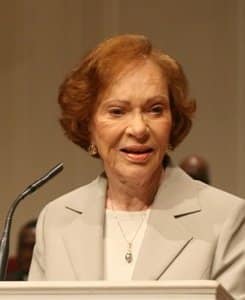
Former First Lady Rosalynn Carter says mental health is a moral issue.
|
Former First Lady Rosalynn Carter, author of Within Our Reach: Ending the Mental Health Crisis, identified mental illness as a “moral issue” often overlooked by churches.
Compared to Baptists’ concern for physical illness witnessed by the building of hospitals, she said their attitude toward mental health has largely been marked by neglect.
The largest mental institutions in America today are prisons and jails, she said, while many churches remain “bastions of exclusion” for people with mental illness and their families.
“I receive many letters from people who feel excluded or wounded by their own congregation,” she said.
Studying the Bible she noticed that in stories where Jesus healed physical illnesses, those individuals either approached Jesus or were brought by friends. Whenever Jesus cast out a demon — the first-century understanding of symptoms today that would probably be diagnosed as schizophrenia, epilepsy or bipolar disorder — he took the initiative.
“Does that indicate we Christians need to take more initiative in dealing with this particular challenge?” she asked.
She said some churches are providing models for extensive mental health-care programs, but there are simple things that any congregation can do, like offering to drive someone to a doctor’s appointment for deliver groceries to those who cannot get out. Telephone calls and home visits are important both to patients and caregivers.
“The single most damaging fact in the life of anyone dealing with mental illness is the stigma that alienates and isolates,” she said. With what is known about mental illness today, she said, “there is no reason to feel ashamed” about suffering from a mental illness or knowing someone who does.
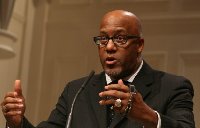
Stephen Thurston
|
Stephen Thurston, president of the National Baptist Convention of America, Inc., delivered a keynote address on the Bible story of Zacchaeus, a tax collector who climbed a tree to see Jesus. Thurston said Zacchaeus’ pledge to give half of his wealth to the poor and repay anyone he owed four times the debt “authenticated his relationship with the Lord.”
“Zacchaeus paints a picture of what we ought to look like in America,” Thurston said. “Zacchaeus shows us how we ought to respond in America. Zacchaeus has a message for those legislators in the House and the Senate who need to recognize that the true value of our Christology is whether or not we have a real relationship with the Lord.”
Ken Fong, senior pastor of Evergreen Baptist Church in Los Angeles, said many Baptist churches in his area debate whether to remove the label from their church signage because so many people have a negative impression of the denomination.

Ken Fong is senior pastor of Evergreen Baptist Church in Los Angeles.
|
Yet many of those same people, he said, have a lot of respect for individual Baptists like Martin Luther King or Jimmy Carter. “I’m telling you, there are people who actually think well of Baptists, but there are not that many Baptists they think well of,” he said.
“Baptist has come to mean intolerant, mean spirited, irrelevant, judgmental, and a bunch of religious stuffed shirts,” Fong said. He said when he introduces himself as a Baptist he often quickly adds “not that kind of Baptist.”
“Maybe that’s what the New Baptist Covenant is about,” Fong said. “I’m not that kind of Baptist. I’m the kind of Baptist that is part of what Jesus started, a revolution of justice and hope.”
New Baptist Covenant II continues Friday Nov. 18, with webcasts and breakout sessions in Atlanta, Los Angeles, Oklahoma City, Philadelphia, San Antonio, Seattle, St. Louis and Washington, D.C. The event wraps up Saturday with hands-on community service in communities where Baptists are gathered.
Locations include St. Luke Memorial Baptist Church in St. Louis. Visit on-demand videos from the host site in Atlanta. A Twitter feed, news feed and photo gallery are also available.
Bob Allen is managing editor of Associated Baptist Press.

